#enkanomiya lore
Explore tagged Tumblr posts
Text
LET ME GO ON PUBLIC RECORD AGAIN RIGHT NOW WHILE WE'RE ALL EXCITED:
Istaroth is the Worst of the Shades, especially as we continuously see Ronova and Rhinedottir be shown for their humanity, for their empathy, and for their genuine desire for things to go accordingly. For their humane nature.
We were introduced to Istaroth in Enkanomiya, as a terrifying and Eldritch deity. She is the only one to grant them mercy, and the way she does so is selfish. By splitting the realms into Evernight and Whitenight, giving humanity a way to avoid the Vishaps, she also introduced a means to measure time.
Istaroth's greatest act of mercy was granting herself a reason to be individually worshiped in a time where forbidden knowledge was ravenous and Teyvat was shaken. Because Enkanomiya fell after the war with the Second Throne That Came After.

Istaroth is not kind, or regarded kindly. She is respected, feared, and sacred beyond understanding.
Sacrificial Fragments, a second book from when Istaroth was worshipped reaffirms this perception of her holy nature.

Enkanomiya calls her Joy, Rage, Longing, Obsession. Mondstadt calls her Merciless. Ravenous. The Godkillers... call her Unrelenting. You understand ?
How does this compare to the other known Shades, Ronova and Rhinedottir ??
Ronova is... compassionate, for one thing. She is introduced to us in Natlan. During which it is revealed that she agreed to work with Natlan against the Abyss via creating the Night Kingdom.

When Mavuika's plan came to pass, Rovona was focused SOLELY on maintaining order. Mavuika will die because that was agreed upon > The Captain will die because it will uphold her curse and because it's mutually beneficial. She allows them to argue about it, she allows them to speak very informally and casually about the might of Celestial Shades without consequence. "Mavuika: After all, leadership is built on the trust of ordinary people. Without them, there is no Archon." "Yohualtecuhtin, Lord of the Night: The Captain envisions a kinder and fairer set of rules for humanity. In addition, he aims to challenge the authority of the Ruler of Death... In a word, his goal is revenge." "Ronova: I now understand that which you seek..." Of the two above lines, Ronova is remarkably silent about the way that these people under her ranking criticize Celestia decisions. We cannot presume the same from the Merciless March of Time, she who ... had the sunchildren and sacrificial dance ceremonies. As for Rhinedottir... she is the most human character in the game. I don't know how else to describe it. Everything that Rhinedottir has ever done has been for her passions and interest in the nature of life and limits of humanity, in knowing and achieving every thing that she is possibly capable of. Go talk to @monards about it, because the point of this post is not about her humanity, but about how Rhinedottir is kinder than Istaroth is. We see this in the way that Durin's recounting of his life was her encouraging him to go and show off his beauty, in Albedo being sent to live in Mondstadt under Alice's watch so that he might know what it means - for him - to be alive, and the way that she interacts with the Hexenzirkel who love her in turn. You learn a lot about a person given who their friends are, and Rhinedottir Gold turns to Alice (Friend of Adults who Still Harbors Hope), Nicole Reeyn (the Guide who Will Never Get Lost), and Andersdotter, she who taught the Hexenzirkel who wanted to share her stories of love and friendship and unending adoration with them for generations. When we compare Istaroth to Ronova and Rhinedottir like this, we do not have stories of her even remotely expressing these same sentiments, because Istaroth is not motivated by them. She is Time, she is curious, and the kindest thing about her is that she loves a good story. And well, she is responsible for the two largest killing forces in the game. Forbidden Knowledge and Erosion. It is by her hand that the Forest (the Withering) dies, and it is by her words that the gods fade. She may not have killed them herself, may not have been the one to damn the ambitious to the skies, may not have been the one who separated the twins... but she certainly is not against indulging, worsening, and Keeping Record of such happenings.
#character analysis#istaroth#istaroth genshin#rhinedottir#rhinedottir genshin impact#ronova#ronova genshin impact#naberius#genshin impact world building#hexenzirkel#celestia lore#celestia theory#enkanomiya lore#enkanomiya#genshin impact#lily's rambles
57 notes
·
View notes
Text

what if venti combined his wisp and human forms
#i went exploring enkanomiya again cause its my favorite location ever#and now im thinking about the Lore#venti tell us about your mom please please please#venti#barbatos#genshin impact#1caru's art
7K notes
·
View notes
Text
i love seeing out of context posts about long-running stories with deep lore because it's always shit like "MAJOR SPOILER WARNING!! i can't believe that the metallic athenaeum's envoy actually used never-ending dance of the 57th universe on rionne as if she's not LITERALLY the incarnate of august?!?!" it's like buddy boy thank you for the spoiler tag but all of those words are incomprehensible without at least 5 years of foreshadowed knowledge, 7 different fan theories, and 21 wiki entries
#rambling#this post was about 3 different fandoms#number 1 was my friend trying to explain to me what was happening to dazai bungo stray dogs (i have not seen bungo stray dogs)#number 2 was ominscient reader viewpoint. anything tagged MAJOR SPOILERS for orv is either completely incomprehensible or like.#an image of someone interacting with a book. and somehow BOTH manage to be emotionally devastating in context#number 3 was me trying to explain genshin lore to a friend and realizing i sounded deranged saying shit like#“after the primoridal one fought the second who came celestia used nails to supposedly heal the land but enkanomiya still sank rip”#how did the wot fandom find this i am a gaming blog mostly..
4K notes
·
View notes
Text

#genshin impact#genshin fanart#artists on tumblr#art#traditional art#aether#lumine#genshin men#why#genshin fandom#genshin art#genshin aether#genshin lumine#genshin lore#genshin quest#enkanomiya
58 notes
·
View notes
Text
in your eyes, i see —
> written for day 4 of bardven week: au/reflection !! i lapis lazuli’d venti <3 you can also find this on ao3 !!
The bard was never quite good at following rules—he is told to do one thing, he hurries to do the opposite of it. Stay in one place? He leaves. No? He hurries to find a “yes.”
This, he finds, is no exception to that.
Perched atop one of the flattened roofs of the buildings, he watches as two men—surrounded by varying sizes of boxes, and sorting them into the back of a wagon, one that has the King’s insignia on it—make a commotion out of one in particular.
The man stumbles with it, the top popping open as it leans forward, the sounds of something clattering and breaking echoing from it. The other man accompanying him seems to snap his head over, aggravated and worried as he rushes towards the mess.
“Are you mad?” He says, harshly, grabbing the lid to the box and helping to heave it up, “Do you know what kind of valuables are in here? If any of these broke—”
“Cease—they all just tumbled forward.” Even he does not sound convinced of himself, a slight tremor to his voice. “Would it help to take a look, if you are so worried?”
“If you are wrong, it is your head I am offering first.”
“And duly noted. Here, set it here.”
They set the box onto the ground, kneeling beside it as they rummage through it, taking out several items and scattering them around themselves. One catches Cecil’s eyes, something he would guess to be medium-length height, covered by a lace veil. The men handle it as though it were a precious gem, quite differently from the way they grabbed at the others—still delicately, yes, but their hands shake with this.
Fascinating… he wants a closer look.
Shuffling, he digs a hand into his bottom for a rather large rock he had picked up earlier that day, and sits more upright so that he has a better angle. Reels his hand back, aims for the boxes besides the wagon as they wait to be loaded into it, and throws. It hits the box sitting on the very top of the pile, causing it to tilt, then fall, creating a domino where it knocks others down.
He snickers at the way the two men immediately jump, turning to the chaos, yelling at the other.
“What was that?” The scolding man demands.
“Those were placed perfectly, someone—”
“Perfectly? Are you trying to shift your incompetence onto others, you had to re-do several.”
It continues, til they are half hidden behind the opposite side of the wagon. A grin splits his face—now is the time!
Weaving down the building the way he had come up it, Cecil lands on the ground in a soft thump of boots. He darts over to where the mirror sits, skidding to a stop, the wind kicked up from his movements lifting the veil covering the object ever so slightly, before it drapes back over it. Cecil gapes, inches closer, awe and an itching curious etched into his being. His hands come to the sides, fingers carefully hooking around the veil, and—
Upon folding the fabric over the object, he finds… a mirror?
Cecil leans, right hand going to the stone tiled ground, to help when he shifts his balance, his brows furrowing as he observes. The glass does not reflect his image, nor the area around or behind him—though he cannot tell if it is because of how dark it is, how dusty everything is, or because this angle would not allow it, to say?
(Strangely… peering around it, he feels as though the mirror is observing him, too.)
It has an intricate framing. Atop is a sundial-like halo, with Cecilia’s cradled inside—it arches out in waves of leaves around the mirror, curving in, looping around to create a mimed sun, then out (although, the left side seems to create a moon, instead.) It repeats this, til it reaches the bottom, where it blossoms into an ivy-like draping of vines. Dappled across the leaves, there are four other Cecilia’s: two on the top parts, closer to the sundial, and two on the bottom parts, closer to the ivy. Above the ivy is something almost akin to a plaque, adorned with those same leaves, curving towards writing, though the words are hardly legible. It is mostly silver, although tarnished and worn from age. The parts not silver (and still well intact, shiny) are the golden Cecilia’s, with teal gems inlaid into the buds, one of them darker than the others.
“Oh,” he breathes, “you are a wonder to lay a gaze upon.”
At his words, the gems seem to flash brighter, shinier, for a fleeting moment. He gapes, pivoting on his heels, wondering if one of the men managed to sneak on him when he was not paying attention, and being met with the same walls, the same darkness, the same distracted men, bickering with one another quite a distance away. Hm.
Narrows his eyes, turns to the mirror, tilting it towards him—
There is a rippling across the glass, and he startles seeing his image.
His own wide eyes lock with a reflected pair. Except—he had seen himself, before this, in the reflections of passing metals. Now, there seem to be distress lines underneath his eyes, and his pupils have constricted into near pinpricks? He drags a finger up, prodding at the skin, and runs a nail over the bags of his eyes; watching as a relaxation overtakes his features, the pinpricks slowly dilating to dots, though the lines never leave.
Dirt skitters under his nails (and a shock of cold, cold, cold goes throughout his entire hand), as he presses his fingers into the stone. He moves his touch from his face to the glass of the mirror, nearer, and nearer…
“—was a dupe!”
“We would have known that earlier if you were not distracting me!”
“I was distracting you?”
Cecil jerks away, head snapping to where the voices are. Grimaces, his heart thudding. So soon?
He reaches behind the mirror, grabbing the veil bunched behind the mirror to lift it back over and cover it. Then, he grabs it with both arms, pulls it to his chest, and heaves it up as he stands, stumbling (and scrambling to stay upright) a little when he gets to full height—his cloak falling closed over him in a silent swoosh of fabric, hiding his find from sight. He refuses to leave without it.
Shifting to the side, he eyes the area surrounding him, spotting a pocket of space within the stacked boxes he could squeeze through, leading to the alleyways. He sprints over, footsteps carefully light—though, he cannot help but wonder if the mirror should be heavier than it is, feeling as though he were carrying a full to the brim mug, instead—and turns to shoulder his way in. Once out, he takes off, the boxes wobbling at his departure, right as the men arrive.
There is shouting, cursing. He urges himself to run faster, weaving around walls.
——
It must be a fortunate day for him, indeed, because the view of the house he has been situated in peeks into view. That has him slowing, breaths coming out short, clipped.
Walking up to the door, he raises himself upon his tip-toes, checking through the small pane of glass looking into the house. He glances to the left, then the right, and nearly presses his nose against the glass to stare straight ahead—no shadows, no figures, no out of places where someone could hide…
He drops his arms, letting them fall to his waist, holding the mirror to his stomach, and his cloak flutters from it—he hopes that hides it even more. A quick inhale, exhale, he nudges the door open, clicking it shut as silently as possible; and, after another cursory look around, he bounds to the stairs, delicately taking two steps up each time, landing onto the second floor in his quickest record yet, and skirting around to his room.
It is not until he has the door properly locked (the metal lock was another find of his!), with a chair shielding the entrance to the room, that he allows himself to feel fully safe and comfortable.
“Okay,” Cecil murmurs, grabbing the mirror from where he had leaned it against a wall, “Let us see if we can find you somewhere more permanent to stay, hm?”
He has to keep it out of immediate sight (the mirror looks ancient, every single person here would pounce for the chance), so that would narrow the places to… hm.
Walking to his desk, he hooks a foot around the legs of the stool—which, thankfully, does not shriek when he drags it away. Ducking underneath, and crawling to the back, where the wood of the desk meets the wall, he gently sets the mirror there—silver ivy digging into the floor. He hums, narrowing his eyes, considering, and clambers out from the desk to grab any spare fabrics he has (not many, and he quietly mourns that he may not be able to use them) to scatter them around the bottom of the mirror. What could be a “nest” of sorts, almost.
“There!” He attempts to “fluff them,” “That should be sufficient for the moment.”
Reaching behind the mirror, Cecil grabs at the veil, lifting it up, and pulling it down, to add it to the pile; carefully wrapping it around the ivy. When he sits on his haunches, satisfied with his work, he once more meets his mirrored gaze.
And—still, there are lines of distress etched under his eyes. Though, they seem to have… lessened, now.
“Apologies for how unconventional this is,” he laughs, a small thing. The beginnings of aches from his escape start to seep in, as well as a twisting in his stomach, and exhaustion tugs at his body—he should not have pushed himself to run like he had, should he have, huh. “I imagine you would want to be hung somewhere instead, no? Ah, I fear I do not have any nails to do so..”
Tilting his head, he regards the silver and gold of the mirror.
“Perhaps I could do something for you? A cleaning sounds nice, does it not?” He rubs at his chin, scooting closer. “Who knows how long you have been buried under all that dirt…”
There is—a feeling, that layers over him, then. Telling him that he should wait for a response from his reflection.
Of course, it does not reply, even after he waits for a while. It is only showing himself, back to himself; it is only an inanimate object.
He muffles a yawn into his left hand’s palm. Blinks away any stray tears that had bubbled up from the action, and turns to the stool, stretching out to haul it to where it had sat beforehand, cozied right up against the desk—essentially boxing both him and his mirror in this little space, though his feet bump besides the feet of the stool. Do not want to fall asleep without concealing it in some manner!
Shuffling onto the floor, he curls his legs up to his waist, and cocoons himself in his cloak, nuzzling closer to the fabric bunched around his neck, breathing out a soft sigh. Before he can get too comfortable, he sticks an arm out from the cocoon, to pat at the silver framing. “That will have to wait, though. I should be able to find things to make you spick and shiny tomorrow! My energy is sapped today… this was quite an adventure.”
With that said, he shifts back to his position, snuggling into his folded arms contentedly.
(As he drifts off, another ripple skims across the mirror’s glass, beginning to pulsate and burble in a manner similar to that of a water droplet hitting still water. A hand appears behind it all, blurry, touching lightly at their side of the mirror—and everything clears, as the reflection of Cecil cracks their eyes open, eyes glinting teal. They push themself onto their elbows, and slowly dragging their gaze around the area they have been situated in.
With an unchanging expression of blankness, they look to the wood of the desk, each etched in grove of it, to how caged in they are, a box-like space that could only fit someone small under it without hurting, to the stool blocking them in, to the fabrics blanketing their form…. and, then, finally, their gaze lands on Cecil.
Their hand twitches, a minuscule movement. They dip closer, hand trailing to where his hair splays across those fabrics, raven locks intermingling under and over a variety of worn colors. The reflection tilts their head at him, at the steady raise of his chest when he breathes, and the fluttering of his lashes.
Brows knit, a slight wrinkle forming.
There are no sounds when they lower themself, arranging their limbs to mirror how he lays on the floor. Their expressions remain that way for a moment longer—Cecil nestling further into his cloak—before smoothing it out, and closing their eyes.)
——
The day after, Cecil makes good on his words.
He tends to make a bit of a ruckus, yet… it has never been this quite of an uproar, before. It seems as though word spread fast of “missing objects,” coupled with a description that matches the mirror he had taken, along with a few others of the items he saw (those men must have been spotted by another.) When he had gone out to find any sort of soap (one of the others were keeping the house’s in their room, when he had awoken, blasted, and he is not risking his tools in case they break again) there were a decent number of people whispering of it.
“I heard the mirror was magical,” a lady says to another. “A looking glass into other worlds.”
“Magical? Do not be absurd, that would have never made it this far into the city.”
“Why else would the guards be so insistent?”
“Silver, Laurel—pure silver! Do you know how much that would sell for??”
Lugging the stool away from his desk once more, he sets down the soap he had managed to grab, along with a small wooden bucket of water, a half full sack of vinegar, and a spare rag. He recounts the events, musing on them aloud. “You have become a striking commodity,” he says, “it felt as though there were nary a person who was not talking about you!”
Cecil leaves the stool where it is, having blocked the door to his room with not only a broom, but a pile of books. This way, he will be prepared!
Squeezing a dollop of soap into the water, and sloshing the rag in afterwards to mix both together, he continues, “Luck must have truly rolled to my side, then, huh?”
Pulling the rag out, he brings up another hand to wring out the excess water (and, having traded his blouse and vest for a tunic when he had returned, it does not drench him, either). Scooting towards the mirror, he brings it up to the silver framing, and begins to scrub away the tarnishing that has creeped its way across. The detailing proves to be a tad difficult, as he has to apply pressure to the rag to get in between the intricate designs, and the cracks of them, where dirt and dust have hidden themselves in, but—when he finally leans back to see his work, he smiles at how radiant it seems, now.
Though, he still is not finished, yet: the ivy and plaque is left of the silver. He carefully lifts the mirror from the fabric, to angle the ivy into a better view. Then, with another dip into the bucket, and another wring of the rag, he proceeds forward.
As the tarnish is washed away, and the ivy shines, the writing of the plaque slowly shows itself: looping, fanciful cursive of what seems to be a description?
Cecil squints. Scrubs once more, using the tips of his nails inside the rag to scratch the dirt off from the words.
The binding, written as so to not invoke her wrath:
sutneV
Henceforth, from here on, to forever remain a mere echo.
And.
“Huh?” Cecil murmurs, dropping the rag, sheer confoundment in his voice, “Is that the name of someone? Ehh, what have I taken… is this someone’s personal mirror...”
Except—the words are far too personalized. It does not seem to be describing someone, more as it is describing… what had happened to them? The words, upon closer examination, is scrawled deeply into the silver, and he wonders what sorts of force the person writing it had been using to engrave it so harshly, that he can see the minute scrapes.
He glances upwards, finding the stare of his reflection.
“Is that why they were taking you somewhere?” Cecil furrows his brows, glancing down as presses his lips into a thin line. His left hand is raised to tap at his chin, ruminating, expression turning from a scowl to a curious one. “You must be special. I wonder what demand was given, if any reward had awaited those men, especially since they were terribly worried about breaking you. What happens when you shatter—”
There is a flare of teal, nearly blinding in its dazzling, followed quickly by a THUMP, sounding as though someone were pounding their bare fists against a solid surface, which is then overwhelmed by a horrible screeching—something being grated across glass in a rising pitch.
He startles, hand dropping from his chin to his waist, the other going to cover his ear, he left any “weapon” he could have in other parts of his room, he does not have anything to defend with—
The very first thing he sees, is his reflection bodily pushing themself away from the glass, in a pose he knows that he himself is not doing. The second thing he sees, in rapid succession, is that his reflection looks to be terrified, pupils constricted into slits.
They both freeze.
Cecil’s thoughts race, not only because of the sinking dread of ah, so that is the reason why it felt as though I was being watched at times, but, because what did he say to elicit such a reaction? He recites each word he had said in his head, and suppresses a wince, alongside a grimace, getting to the shatter part.
“I am not—” Eugh, his voice. He clears his throat, “I am not going to shatter you, nor bring any other harm. I was—wondering, if anything were to happen, if it was necessary to break the mirror for… ah, if there was a ritual, or….”
His words fizzle out. His reflection is still leaning away, hands now held to their chest, though they do not look as stricken. Eyeing him, a little warily, the teal gems embedded in the silver framing flickering between brightness of glowing.
The nails of his fingers prod against his palm, when he clenches his hand, a repetitive motion as he thinks. He unfurls it, twisting it so that the palm faces the ceiling, and—with a small breath—reaches towards them, an offering of a branch. “You will be treated with nothing but care, here,” he does not touch the glass, waiting for the others’ response. “I promise. You are protected.”
After all, he was the one to have taken them, and he can only assume that something was planned for them. As unexpected it certainly is, and while Cecil’s heart continues to thud erratically in his chest, he will not turn away someone.
(Especially…. well, he can hazard a guess that they were not always inside a mirror—that the writing implies the people who did this had to go behind someone's back to trap them.)
They stare at him, brows knitting together, considering. Then, they inch towards, extending out a hand, pausing it before it touches their side of the glass. Gingerly as he can, Cecil turns his hand, so that the back of it now faces the ceiling instead, and does the same—a scant space between the glossy material.
Their hand drops. They tilt their head, pupils dilating slightly to dots.
Ah! Success!
“Thank you,” he says, sincerely. Pulls his hand back, to fold it over the other, holding it in front of him loosely. “Are you—there is a name engraved on here, is that your name?”
The expression they make is a mix between indignant and a quiet upset, blowing out puffs of air before opening their mouth, yet no sounds arise from it—no, he should rephrase. There are sounds, yet try as he might, straining his ears to the muffled noises, he cannot hear them.
It must show. They try again, exaggerating the words, and still…
Firmly confirmed, they deflate, sinking into their cloak, their shoulders falling as they hunch. The teal gems dim drastically, the shine to them disappearing momentarily, then reigniting when… his companion(?) heaves themself upright, and crosses their arms with a pout to their lips, brows furrowed into a rather righteous fury; though, he notes an edge of exhaustion to it.
“How can this be—I heard you earlier?”
They cringe.
“… it was because you screamed, though.”
Half shrugging, they nod their head, tapping at their throat and miming an injury. Similar limitations to his own body, then: if they yell for too long, it would result in dire, and often hurtful, consequences.
Cecil hums. “Would you… be able to spell it out?”
They spring up, the ahoge atop their hair swaying with the movement, braids bouncing, their mouth forming a small ‘o.’ Intently, they bring both hands up to their collarbone, meticulously forming five letters with their fingers: V-E-N-T-I.
“Venti?” He repeats. They nod vigorously.
A soft smile tugs at him, and he warmly greets, “Hello, Venti.”
Venti smiles back, seeming to rock on their heels. They halt, then point to him, spelling out the word N-A-M-E, and clasping their hands, pressing them to their left cheek. Curious.
Oh! He lifts his hands up, to spell: C-E-C-I-L.
They are leaning towards him, eyes locked onto the hands, and mouthing each letter to themself as it is revealed. Once he is finished, they bounce backwards, doing a lavish bow, extending their arm out in a flourish at the end. He snickers—is this their way of greeting him?
“A pleasure to meet you, as well!” Cecil exclaims, allowing the bemusement to leak through.
As fluidly as they had bowed, Venti stands, retracting their arm to their side, clasping both hands behind their back. They get closer to the glass, braids swinging, and he squints when the hair disappears briefly, re-appearing in seconds. It does it again, and—
“Oh, your glass, I still have not cleaned it!” He gasps. “If I—may? Have I overstepped with that?”
They shake their head “no,” rather fiercely. Seem to urge him to continue on with several varying gestures, such as a shooing of hands to the bucket, and reeling it back in, or balling their fists and they bounce up and down, or even tugging at an imaginary line. Cecil can feel his shoulders relax at it, picking the rag from where had dropped it.
“How long has it been since you were?”
In a snap, their lively motion slows. Eyes casted down, as they seem to think, then cast their gaze around, trying to look past Cecil. Eventually, they give an uncertain, jerky half shrug.
A frown settles upon Cecil’s face, dunking the rag back into the bucket, and swishing it around in one place, almost absentmindedly as he falls into a deep thinking. He picks at the words he wishes to choose, stripping out the ones that are too off, too pushing, a careful hesitation to them. “Were you… left?”
And Venti—
Looks surprised, their eyes as wide as saucers, for a moment (and how strange it is to see his face make that expression?) Pauses. They wave their hands in a dismissive “no” with a small sheepish smile, mouth opening as if they were laughing off a silly notion—before there is a split second of conflict, a wrinkle to their down-turned brows. They continue their motions, stop, stall, when something keeps coming back to their mind, and clench their fists. It ends with them shrinking into themself, ducking their head into the bunched fabric of their cloak.
“I apologize,” Cecil says, quickly, regret lacing his words, recognizing that this is a sore spot. Then, “Have you ever seen a cat?”
Venti looks at him as if he had grown another head.
“Before,” he adds, not elaborating whether he means the times before Venti had been trapped or the times they saw during it, “have you ever seen one? I have heard they are fluffy.”
Their brows furrow, pressing their frown into the cloak. Hands unfold, forming an odd shape that Cecil truly cannot describe, and they shake their head—then jump, and quickly form another shape: hooking their thumbs together, the palms of their hands fluttering like a bird’s wings.
“A bird!?”
The shape stays, as they seem to giggle. Brightening further, they shift it so that only one hand is up, in the vague approximation of a horse?
“And a horse??”
For the remainder of the cleaning, he keeps prodding them, eventually diving from what they have seen to fantastical situations. These ones he likes doing, he is sure that the fond smile he gained when Venti had full bodily laughed at his question of “Would you ever pet a dragon?” is still there. They keep this up til Cecil has to light a candle, wanting to have their conversation carry on—but finding that the reflection is half-made, and reluctantly bids goodbye, setting everything back so that Venti is laid in a comfortable place once again.
——
In the following days after, the search for the mirror intensifies—new people trying to find it, dressed in coats with a triquetra insignia. The news has him slinking towards his room, relegating to stay there for the time being.
“Care for a second round of questions?” He inquires, sitting with his legs crossed, a small stack of papers placed in his lap. Besides him is a pot of ink. He holds a quill up to embellish his question, twirling it, and waving the feathered end at them.
Venti blinks at him. Points down at the papers.
He lifts them up, showing them more properly to the other. “I wondered if we would be able to communicate another way, if we reflected this?”
A hand raises to Venti’s chin, and an expression of utmost consideration dawns on them. They, then, nod firmly—mimicking leaning forward with their hands, pointing to the top of the mirror, and Cecil places the quill next to the pot so that he can follow their question. As he had the day before, he grabs the mirror and repositions the fabrics underneath them, setting the mirror back down so that it is now titled comfortably towards the papers.
There is a rippling sent across the glass, and the reflection appears. He waits, keeping himself still, and silently sighs in relief when two hands pop into view, wiggling the fingers—and by some working, it seems to be in the same direction Cecil sits.
Reflected, yes, but not fully. As if Venti had turned the paper around so they were where he is.
“Okay,” he mumbles, excited, “ready?”
What he learns from their conversations is this:
Venti has… three colors, they are fond of?
(“Do you have a color you favor?” Cecil writes.
It appears in the mirror, though the quill seems slower, more so tracing the words. There is a moment where Venti processes the question, a static image of Cecil’s reflection upon the glass. Then, the quill moves, the lines growing steadier as it proceeds into a … small doodle of an eye, with three evenly spaced lines being drawn across inside the iris?
Venti taps at the next number, when Cecil asks what they mean. He imagines they would be giggling.)
Venti likes dresses.
(“What clothes would you wear, if you could?” Cecil writes, pauses, and adds, “We could reflect them.”
The response this time, after the reflection is finished writing Cecil’s question, is near instantaneous: another doodle, this one a rendition of Cecil, where he is wearing a dress in a style he does not recognize—a solid band wrapped around the middle, while the sleeves are held up to the shoulders by circles, a flowy fabric connecting to it and to the arms.)
Venti likes soft materials.
(“Are these okay for you?” Cecil writes, then draws an arrow down to the bundle underneath the mirror.
“Not connected to the framing, so I cannot feel it.” And, oh, “But, yes. They look nice, good to hold, and touch. Would like to.”
“What are you connected to?”
The quill taps at the paper, once, twice, looping around in a tiny doodling scratch on the third. One hand spreads across, to hold it down, as they sprawl out: “The glass, mostly. My door. And the gems—those are mine, actually! But not the framing.”)
And one that has him rethinking where he placed them:
(“Are you okay with this place?” Cecil writes.
The quill races to reply, movements quick, “No. Please move me, cramped.”
Though he knows this entire thing has gone a little fast, that they could not find the right moment to discuss where Venti goes, especially when Cecil had been believing what he had taken was fully inanimate not even a day ago, he still feels a pang of guilt strike him. He yelps, “Ah—! My deepest apologies, I will, where do you—?”
By the second he has gotten out “apologies,” the quill is a blur, to write: “It is okay, it is okay! Anywhere, not walled in.”
“Would you like for me to do it now?”
“After. Want to do more questions!”)
Then it is Cecil’s turn, and Venti is very persistent.
(“Why do you wear a cloak?”
“To keep myself from freezing,” and he almost laughs, responding—have they been waiting on this one? “These lands are rather frigid. So I wear a heavy and quite comfortable fabric.”
“Is that why you have braids? You should wear your hair down, that would help better.”
“I suppose, but it would also get in the way more.”
“Practicality!” And it is written with such a flourish, he thinks Venti would be crowing. A cheer, an awe. “You should wear your hair down once. Pretty hair.”
And that shocks him enough into the quill slipping down his fingers, splotches of ink splattering against the papers. “Ah..?” He squeaks. “Thank you.”)
(“Do you have other clothes? You mentioned we could reflect them.”
“I do,” but that was before he learned of Venti’s preferred style. “Though, ehh, they may not be ones you enjoy, I am thinking…”
“Huh? What? Let me see?” Cecil’s eyes widen, ever so slightly, watching the quill move to write lines upon lines, once more a blur of white. Vigorated. “Your sleeves have frills, do the others? I like your shorts. Are there any other clothings that have the stitches on the side? I have never seen those, I like them! Are there frills? Do you have beads for the other clothings, similar to the ones for your boots?”
Cecil laughs, brightly, at their enthusiasm. He drops the quill onto the papers to make a “slow down” motion with his hands. “Okay, okay, I can show you. One at a time?”
He has to move Venti atop the desk, leaning them against the wall as he rummages through clothing. Rather than change into them, he holds them up to where they should be, whether the chest or his legs—Venti enjoys it greatly, making grand gestures, clapping their hands and bouncing up and down to point at what he thinks they like the most about them.)
(“Do you have a color you favor?”
A snicker bubbles in his throat, one that he has to restrain from building further, swallowing it down. Repeating a question he asked them?
“Not one in particular,” he pauses, thinking, “it switches whenever I learn of others. There are many beautiful colors, such as blue, or purple, or green!”
“What of teal?”
Cecil has to raise his palm up to press it to his mouth, a noise escaping from him. He glances at the gems embedded in the framing, how they cast a steady glow, almost pulsing. With a small smile, he replies, “I like it, it is a wondrous one.”
The gems glow brighter.)
——
They end up coming to a decision—that Cecil is to place the mirror on his bed. That way, Venti will have a better view of the room, and more space, and Cecil can hide them relatively quickly if a reason arises for it.
He watches, endeared, as they sway side to side while gazing at everything he has in his room, an impromptu dance. They clasp their hands together, unclasp them at something they find exciting, then rock their hands alongside the rocking they are already doing.
What a personality you have, he thinks, fondly. And it is that thought that has his smile fall to a contemplative frown, canting his head to the side. So why did they seal you away?
——
“Is there a way to free you?” He asks, toying with the threads of his quilt.
Venti, sat at the other end, so they can face each-other, snaps their head over—their pupils constricted into thin slits once more, distress lines under their eyes. They grip at their forearms, inclining their head, a quiet confusion there.
“I—you have not left the people’s minds, and I fear the worst. If we could do anything to help you…?”
Their brows furrow, knitting together, before their expression drops entirely. It tugs at his heart, threatening to break it, a lovely person such as they being forced into a confinement, for who knows how long—
“Why were you trapped at all?
They fidget with their braids, seeming to sigh. Their hands raise to form a square, asking for the paper. He brings them, laying them out, tilting the mirror carefully, and waiting for a ripple to sweep across the glass—writing out a simple question mark for them once it does. Venti takes over right after, quill pausing in increments, chewing at the words to write.
“Mistake,” pause, “I had been edging the line. Playing, doing small tricks. But it went too far. I destroyed a… mechanism, they were to use. People got upset, and I was going to try to fix it! But they were still mad. And thought this was the final strike.”
Their hand trembles. “I did not mean to break it. Really.”
“That is awful,” and there is a thickness to his voice, “that would be why they wrote your name backwards..”
“They did?”
“Yes? Oh,” He shuffles closer, to trace the words of the plaque. Recites them aloud, so that Venti could hear them—for what must be the first time since they have been put into this, and when they write next, the lines are wobbly.
“They did not allow her to know? I thought… all this time…”
“I am sorry, Venti.”
“No, no. I thank you. If they would dare to try this, of everything, I wonder what else…” The quill stills. “Your question. I do know of a way to escape.”
“You do?”
“Yes, it is something to do with the glass, but that is all I know… what else is there on the mirror?”
“Oh! One of your gems has lost its glow, and—” He leans them back, mimes flipping the mirror around, and waits for their nod to continue. He traces a finger along the edges, and finds it to be completely smooth. Flipping it so that Venti can face them again, he trails his touch over the other details, poking and prodding—and, there, underneath the plaque, is an indent of a hole, slanted and small. So out of the way it is, he silently curses himself that he missed it while he was washing their mirror.
“There is a hole?”
Venti looks stunned. They gesture frantically to the papers.
“That is why they hardly told me anything!” They write out, writing scratchy, scribbling, ink scattering in uneven stray splotches, “Right there!!! They showed me the key and knew no one would look for it!!! A secret!!!”
“Which is?”
“The gems! They placed them in a certain way. Start taking them out, from the top, to bottom, and do not touch the one without a glow in any way. Please!”
Cecil does not waste any time, determination overtaking him. He scrambles off the bed to find something to pry out the gems, grabbing a blunt knife, and using the edge of it to do the job. It is slow going, made more aware by Venti thumping their hands against the glass in an almost rhythmic like manner, but—the mirror shudders, and Venti’s image is washed away by a wave of teal, remaining that way as the last gem makes a high pitched whine, before it falls off.
He picks it up and shoves it underneath the plaque, hearing a click. For a second, nothing happens—only for a light to burst out, teal emitting from the space, and Venti’s image re-appears. They blink and blink, eyes squinting, before widening, and placing their hands atop their side of the glass. There is a ticking sound, and they startle at a teal light being cast over them.
Both of their eyes meet.
Cecil reaches out, gently placing his hands against theirs. The glass is warming up, and solid, before it gives in, and his hands sink, sink, sink, til—Venti grips back at him.
He pulls. It feels heavy, as though he were moving through sludge—the glass follows after his hands, stretching, gradually solidifying into hands that are shattered into thousands of glass pieces, reflecting the little light that is inside the room, a prism of colors. He heaves, yanking, and more is revealed: arms, a head, shoulders, and—
Vaguely, he is aware of how the bed squeals under him, as he bounces backwards. He feels—odd, as though a part of him had just been given away. Then, a weight makes itself known on his own torso, and he snaps his eyes open.
Halfway sprawled on the bed, and the upper half of them clutching onto Cecil, lays Venti. Their form—the silhouette of it looking like Cecil’s—is quivering, glass melding together in swift, almost confused, movements as they try to gather themselves together. By the time they can look up at Cecil (and having helped them into a pose that would not hurt their legs), their form is still a glass-like transparency. A ghostly, reflective Cecil.
“Hello,” he whispers.
They are still, gaze expressionless, tilting their head—and two bangs separate from the action. They squeeze their hands around his biceps, replying, equally softly, an echoing pitch to their voice, “Hello.”
Cecil would say they both sit there, staring, for what must be minutes. Then, suddenly, Venti gapes, and pushes themselves off from him, turning to grab at the mirror—and he swears his jaw could have dropped seeing the state of it, wavering like water, nearly having disappeared from existence, all except for the still glowing plaque.
They pick it up, hold it in their hands. And—
Crush it. Bare handedly. Oh.
“Sloppy job,” they murmur. They swivel, dropping the crumbs of it on the bed, and when he looks past them, the mirror has completely vanished. Not a trace of it left.
He glances back to Venti, feeling oddly breathless, as he shifts to move his legs underneath him. There is a breath of a pause, before a body collides against his once more, hugging him tightly, knocking their cheeks together. A gratitude lacing every part of it.
——
Since then, Venti finds delight in switching up how they look. Sometimes, they keep their hood over their face, hair curtaining their expression—other times, they will show off a new outfit, excited to see how elaborate they can make it. Both times, however, they do this all while pressing themself close to him.
“Your clothes have changed, and so have your eyes,” Cecil lowly whispers to them, when they have been left alone, a curious note to his voice, “Yet you still share my hair?”
They turn, offering him a radiant smile. “I told you—it is pretty!”
#genshin impact#venti#nameless bard#bardven#bardvenweek2025#funniest part of this is that i kept imagining deca was like . vaguely aware of what was to come.#?? like okay so there’s .. a mirror …. that may have been passed down from lady time . where#the guards are Scrambling#anyways i kept the timeline ambiguous but venti has been aware of themself for a while before they met bard#i was thinking enkanomiya time bc . well. given the sun childrens everything the people there absolutely wouldve trapped something#in an object if they could#but i. am not confident in my enaknomiya lore so take that with a grain of salt#i see people’s bard adjusting to times but i offer you. venti adjusting to bards time DBDJD#anyways not enkanomiya but . not too recent in bards time either#ambiguity ily#lantern’s writing corner
21 notes
·
View notes
Text
Genshin Impact Timeline: Analysis and Theory (Part 1: Ancient History)

Genshin Impact Timeline: Analysis and Theory Master-List
So the timeline of Genshin Impact lore is questionable at best and straight-up confusing at worst. However, I’ve been working on a fic series thingie that may never see the light of day that required me to do some digging, so here I am. I put the rest under-the-cut because it gets rather lengthy. Also this is all largely theoretical and gained from the process of analysis. I used the game itself and the Genshin Impact wiki to help me along. I will possibly add to this as updates with new information or information that corrects past misunderstandings crop up. There are definite spoilers below for pretty much all of the Genshin Impact storyline and this is a VERY long post so please beware!
The Seven Sovereigns
So, apparently at the start of everything in Teyvat, there were the Seven Sovereigns which apparently were the seven strongest elemental dragons for their respective element [Book: Byakuyakoku Collection Volume 2]. As a heads up, we do not have names for the majority of these dragons. These Seven Sovereigns had a king (who was first introduced as a plot point in Nahida’s second story quest) known as King Nibelung. (It is worth noting here that the name “Nibelung” likely comes from Wagner’s opera Der Ring Des Nibelungen but is also a name that appears in Norse legends and Germanic myths). These dragons ruled Teyvat and had elemental ‘Authorities’ until they were defeated by an individual referred to as the ‘Usurper’. It is highly implied that this ‘first usurper’ is the Primordial One. Notably, the Primordial One is often implied to be the Heavenly Principles, though, so far as I know, this has not been confirmed, though it is not a bad theory. Supporting this theory is Neuvillette’s comment that the first usurper (i.e. the primordial one) was the one who bested the seven sovereigns, while Focalors said it was the Heavenly Principles that stole the Seven Soverign’s authority. However, for the sake of simplicity, I will continue referring to this character as ‘The Primordial One’ rather than ‘The Heavenly Principles.’
The Primordial One apparently appeared out of nowhere and is highly implied to be an outlander, and as Nahida suggests at the end of the Sumeru Archon quest, the First Descender and thereby from another world, similar to the Traveler. A scribe in Enkanomiya used the name ‘Phanes’ for them and described how “the eternal throne of the heaven’s” appeared at the same time as the Primordial One [Book: Byakuyakoku Collection]. No matter where they came from though, they did battle with the seven sovereigns for what is implied to have been a lengthy period before they at long last won and, upon doing so, took part of the seven authorities from themself and their ‘4 shining shades.’ (NOTE: The best I can figure is that these ‘shades’ were created by the Primordial One from the Primordial One and are thus aspects of the Primordial One, though it is mentioned in some sources, such as the Byakuyakoku Collection, that the Primordial One would work the shades, implying that perhaps these shades were more like children, or helpers to the Primordial One.) These shades are/were able to operate separately from one another, as evidenced by Istaroth, a shade who held dominion over time and wind, coming to assist Enkanomiya when none of the other’s could hear the cries of the people of Enkanmoiya [Book: Byakuyakoku Collection Volume 2]. Additionally, these shades are implied to be of a ‘higher power’ than the Archons with Istaroth being labeled as a ‘higher power' than Raiden Makoto in Ei’s second story quest. Additionally, these shades may have even helped create at least some of the archons, as the thus far unnamed Shade of Life* assisted in creating Egeria after the Sovereign Dragon of Water was defeated [Item: Fontaine Wind-Glider].
Seemingly, in the course of the forty year war between the Primordial One and the Sovereign Dragons, the Primordial one emerged victorious[Book: Byakuyakoku Collection Volume 2]. Most information states that, after the Seven Sovereigns were defeated, the Primordial One created heaven and earth in preparation for humanity [Book: Byakuyakoku Collection Volume 2 ]. Humans apparently came onto the scene approximately 400 years after the first appearance of the Primordial one and made a covenant with them [Book: Byakuyakoku Collection Volume 2 ]. The contents of this covenant are unfortunately unclear, though it is mentioned that the Primordial One had a plan for humans and that there was apparently one taboo: Succumbing to temptation. Interestingly, volume 2 of the Byakuyakoku Collection also mentions that the path to temptation is sealed. It is possible that ‘temptation’ refers to forbidden knowledge or something of that sort.
The Second One Who Came.
At some point in time, while Enkanomiya was still part of a single unified human nation that spanned the entire world and after the creation of humanity, but before the Archon war, ‘The Second One Who Came’ (also referred to as the ‘Second Throne in Heaven’) came from ‘beneath the firmament” [Book: Byakuyakoku Collection Volume 2, Artifact: Flower of Paradise Lost- the Amethyst Crown]. It is worth noting here that the second one who came is referred to as ‘Invaders’ indicating a plural group rather than a singular person in the Amethyst Crown artifact from the Flower of Paradise Lost set. It is possible that, since Apep implies Nibelung was revived or returned after defeat, that the Second One Who Came and King Nibelung joined forces against the Primordial one and that this is when the divine nails were used for the first time, but that is merely conjecture. However, we do know that King Nibelung apparently gained access to Forbidden Knowledge and seemingly introduced Forbidden Knowledge to Teyvat in an attempt to beat the Primordial One and “gain the right to shape this new world” [Nahida’s second story quest, Book: Byakuyakoku Collection Volume 2]. While The Second One Who Came ended up fighting the Primordial One for unclear reasons, this war ended up ravaging the heavens and earth, with the Primordial One apparently ending up victorious. It was during this war that Enkanomiya sank beneath the waves [Book: Byakuyakoku Collection Volume 2]. After emerging victorious from this battle, the Primordial One used Divine Nails (like the ones in Dragonspine and the Chasm) to heal the land from the damage done by the Forbidden Knowledge. This could be when the divine nails were sent into Dragonspine into the ancient civilization of Sal Vindagnyr, the Chasm, Tsurumi Island, and the Eternal Oasis. However, if that is the case, then Khaenr’iah would have been appearing around this time since the ‘Scribe’s box’ item from the Dragonspine quest mentions ‘a new nation without gods’ and Khaenr’iah is the only nation without gods that is known to have existed [The Scribe’s Box: Dragonspine quests]. Interestingly, during this war, the Primordial One’s Authority that had been initially taken from the Seven Sovereigns ended up getting damaged, making it so that they could no longer suppress the original order of the world. In order to “continue to subdue and control the resentments and loathing of this world,” the Primordial One was forced to create the gnoses with the assistance of someone referred to as ‘the one who came after’ [Neuvillette’s Character Story: Vision]. It is worth noting here that it is unclear if ‘the one who came after’ is the second one who came or yet another descender, possibly the third one whose body has been suggested to have formed the gnoses [Fontaine Archon Quest]. Interestingly, the people of Enkanomiya did attempt to return to the surface, which is when they learned the Primordial One had been victorious. However, they also learned that the Primordial One had supposedly placed a ban that sealed Enkanomiya from the surface. An NPC in Enkanomiya called Eboshi asserts that the Primordial One/Heavenly Principles did not want anyone who knew the true history of the world to be on the surface, hence the ban. However, the ban is only referred to as a ‘heavenly order’ and the Second One Who Came was apparently connected to the heavens as well, meaning the order may have come from them rather than the Primordial One.
*EDIT: After the release of the 5.6 update archon quest "Paralogism" we now know Shade of Life's name is "Naberius." please note that this name, much like the archon names and the name 'Istaroth' come from the Lesser Key of Solomon: Ars Goetia and is a name of a demon.
#Genshin Impact#Genshin#analysis#theory#Genshin analysis#Genshin theory#mywritings#Mondstadt#Liyue#Inazuma#Sumeru#Fontaine#Khaenr'iah#the seven sovereigns#sovereign dragons#lore#Genshin impact analysis#Genshin impact lore#Enkanomiya#Dragonspine#The primordial one#Heavenly principles#the second one who came#celestia#gnosis#gnoses#Nibelung#Authorities
27 notes
·
View notes
Text
One of my biggest hyperfixations nowadays is the lore of ancient kingdoms in Genshin Impact. I wanna know what they were all about, how life was like for them, what led to their downfalls, and how or if they interacted with one another. It’s said that there used to be a unified civilization of humans in Teyvat, and that’s why so many ruins have similar architectural details despite being spread across all the nations of modern Teyvat. We still have very little lore about the Nameless Ruins in the Chasm, we still don’t even have a name for them despite Dainsleif’s quest taking place there. But there’s also strange similarities between the stories of the ancient kings and how the kingdoms fell. I already buy into the theory that King Deshret of Sumeru/Gurabad may be related to or the same as King Irmin of Khaenri’ah, since the Traveler’s twin is the Abyss Prince/Princess, and the Traveler seems to remind Liloupar of Deshret in terms of looks and powers. And wouldn’t it be fitting for Deshret, who turned down the Gnosis and challenged the heavens by obtaining Forbidden Knowledge (abyssal power) to be in some way related to the king of Khaenri’ah, a nation without a god that hid from Celestia and was later punished for it? And there’s sources about Remus, the king of Remuria, citing Remus as a god king just like Deshret. And Remuria as well as Remus were swallowed by the Abyss, reminding me of the sinking of Enkanomiya, where the names of the people are lifted directly from Greek/Roman mythology. And Remus is directly inspired by the Rome founding myth, while Remuria as a whole is inspired by ancient Rome. And the most tantalizing thing for me has to be the lost kingdom of Sal Vindagnyr, where it seems so cut off from these other lost kingdoms but their princess dreamt of events that wouldn’t come to pass for thousands of years, long after her civilization was destroyed. She was born under an offshoot of Irminsul, and had the power of prophecy through her connection to the tree. She foresaw the Cataclysm in Khaenri’ah, the coming of the abyssal dragon Durin, but she had no frame of reference for when these visions would come to pass. Think about what that would do to you as your kingdom was being swallowed in ice and snow, the gods having forsaken you, and your father asks to see a vision of the snow cleared and blue skies, but you’ve already forgotten what that looks like since it’s been so long in the blizzard. Dragonspine and the ruins of Sal Vindagnyr haunt me.
EDIT: I think I figured something out about Dragonspine. In every source I could find on the topic, people usually sort the Princess’s vision of Durin before the Celestial Nail that destroyed their Irminsul tree. I think, since the people of Sal Vindagnyr proclaimed to be in such close contact with Celestia, that Celestia dropped the nail on Dragonspine as a response to the princess’s vision. They laid down a preemptive strike against the abyss and then realized, “oh shoot, we messed up,” because Durin wouldn’t appear in Mondstadt until thousands of years later! So Celestia gets the heck out of dodge before the humans can seek retribution for the destruction of their home, that’s why they abandoned the people of Sal Vindagnyr. The humans were left wondering what they did wrong, but Celestia is the one at fault! Celestia panicked and messed up!
#genshin impact#Dragonspine#Remuria#Gurabad#Sal Vindagnyr#the chasm#Mondstadt#Liyue#Inazuma#enkanomiya#Sumeru#Fontaine#king Deshret#king Irmin#king Remus#khaenri'ah#Genshin impact lore#lore#theories
108 notes
·
View notes
Text
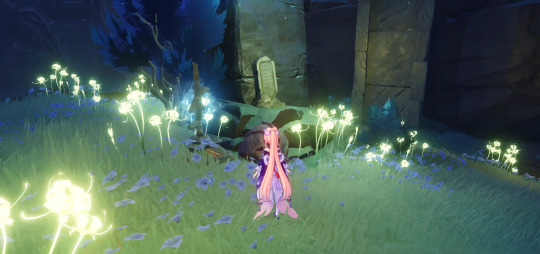
I just learned there are glowing spider lilies on the graves of Enkanomiyan sun children
they are visible only during Evernight and it makes me wonder what exactly the Evernight/Whitenight mechanic is.
I know that some mechanisms appear only during one state or the other and I can handwave it away as "magic", but spider lilies are, you know, special.
they are "flowers of the other shore", plants of the death realm. so, uhm... what exactly does Dainichi Mikoshi do? since Enkanomiya is at the intersection of three realms maybe it sort of... nudges the place towards a specific realm? rather then simply being a very big flashlight.
also why does Dainichi Mikoshi light scare vishaps away? they are creatures of the light realm and non-artificial sun doesn't seem to scare them, so what exactly is happening there? what in the abyss did the priests build?
(also I love how in the language of flowers spider lily means "may we never meet again". the sun children really just said "do not bother us", huh?)
also I missed the Gateway Offering event but apparently at some point Danichi Mikoshi was... a tree? hello?
who forgot to weed out the Irminsul sapling and why is it an invasive species
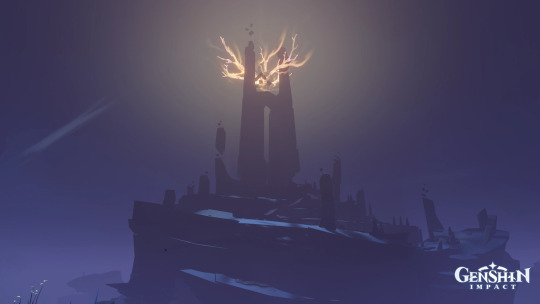
upd:
hmmm

#in moonlight's chill shine petals pale#I should go and check if the leaves are there during the whitenight state#or how they look with elemental sight#I know it's probably a design thing#nothing more#but asdfgh#let me have my crack theories#crackpot hc#genshin lore tumour#enkanomiya#I have questions‚ comments‚ and concerns#after 4.2 this blog contains only crack theories
60 notes
·
View notes
Text
Goooooooood I hope that the Archon Interlude involves connections to Enkanomiya because like!! There's so many connections between Fontaine and Enkanomiya and there is! SOMETHING.
Enkanomiya is the first place where an Abyssal Lector displays the ability to take human form during a World Quest. Enkanomiya contains books that talk about how the Dragon Sovereign of Water will be reborn as a human. Vishaps and marine-based animals feature in both Enkanomiya and Fontaine. The Abyss as an oceanic zone, descending deeper, deeper. Condemnation by the Heavens for the sins of your God.
Enkanomiya has weapons that look a lot like the weapons Childe makes--has people with Greek names, just like how Ajax and Teucer are Greek names. Enkanomiya has a strong theme of sin and condemnation with Aru ritualistically condemning his people before we can fight the Bloodbranch Vishaps. Children who are figurehead rulers are condemned by the masses and executed for the sin of ignorance. Oceanids that don't realize they're really Oceanids and Sinshades who don't realize they're really dead.
Enkanomiya casts the Traveler into the role of Hero and Fontaine is all about performances!
All I want is for Childe to come back with info from Skirk and then he and the Traveler both just kind. Trip and stumble into Enkanomiya and/or the Abyss. And we make some progress with *gestures generally at Childe's whole Thing*
#genshin impact#genshin impact lore#genshin impact analysis#genshin impact thoughts#genshin impact rambles#fontaine#enkanomiya#tartaglia#childe#ajax
33 notes
·
View notes
Text
Destroy Your Suffering
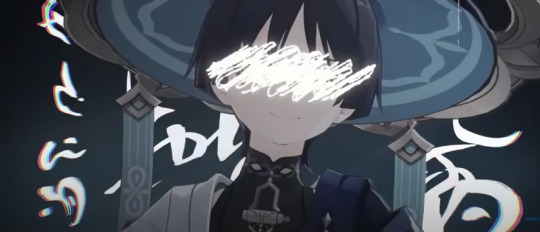
An exploration of karma and Buddhism through Wanderer’s arc
Rise and Fall of an Artificial God
Scaramouche and Watatsumi Island (as a collective identity) have a similar character arc.
Watatsumi people are descendants of Enkanomiya, who were part of the ancient unified civilization created by the Primordial One that fell to the bottom of the ocean between the realms of Light and Abyss.
They both were abandoned by a god:
Scaramouche believes he was discarded by Ei
The Enkanomiyans were, for some reason, forsaken by the Primordial One after they fell to the depths of the ocean
They both were granted divine power:
Scaramouche in the form of the electro gnosis he exchanged for the traveler’s life with Yae Miko
Istaroth, one of the four shining shades of the Primordial One, provided Aberaku with divine knowledge
They both used this divine power to create technology in order to surpass their limitations:
Scaramouche powered Shouki no Kami with the electro gnosis in order to become a god
Aberaku built the artificial sun, Helios, which gave birth to whitenight and evernight and allowed the nation to live comfortably and fend off the Bathysmal Vishaps
They both transformed this technology into a false object of divine worship:
Shouki no kami was built by Dottore and the Akademiya to become Sumeru’s man-made god
The political class of Enkanomiya manipulated their people into believing Helios was a real god
They both suffered until another god helped them out of compassion:
Nahida allowed Scaramouche to find out the truth about his past, and gave him another chance in life by returning his memories to him and taking him under her custody (although, whether as a prisoner or a disciple, who knows)
Orobashi agreed to become Enkanomiya’s new god and ended the tyrannical ruling of the Sun Children, then took the inhabitants to the surface
Their arrogance to appropriate divinity, one way or another, has consequences for both:
After realizing his actions were unjustified, the puppet feels guilt over being unable to help those he cared about in his first “incarnation”, to a point he tries to atone by erasing his existence from Irminsul.
On the other hand, the corrupt reign of the Sun Children motivated the inhabitants of Enkanomiya to seek Orobashi’s help, but in becoming their god he learned about forbidden ancient history told in the book Before Sun And Moon, and sacrificed himself in order to spare his people the punishment.
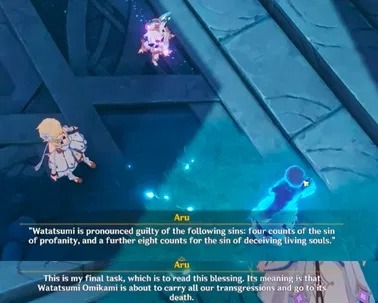
Aru: ”Watatsumi is pronounced guilty of the following sins: four counts of the sin of profanity, and a further eight counts for the sin of deceiving living souls.
Aru: This is my final task, which is to read this blessing. Its meaning is that Watatsumi Omikami is about to carry our transgressions and go to its death.
—from The Subterranian Trials of Drake and Serpent quest
Orobashi would then willingly fulfill the prophecy of his death when he and the Watatsumi soldiers —who were going through a famine due to the infertile conditions of Watatsumi soil— invaded Yashiori Island. This prompted a military response from the Shogunate that would end with the Raiden Shogun striking Watatsumi's god with the Musou no Hitotachi.
Unbeknownst to those involved in the battle, the slaying of the snake god would trigger a chain of events that would bring about pain and resentment, for both Watatsumi people and Scaramouche (among others).
The Chain of Resentment
The philosophy surrounding karma in Buddhism is based on the concept of cause and effect: each of our actions has a consequence, and whatever karma we accumulate in our life is carried into the next one in the cycle of rebirth.
Karma is not a rational thought, it’s the compulsive urge that motivates said actions, which means acting on these urges is a deliberate choice. However, these urges don't exist in isolation to the external conditions created by other people’s karma, that is to say, our existence and the way we live is also the effect of a cause that came before us.
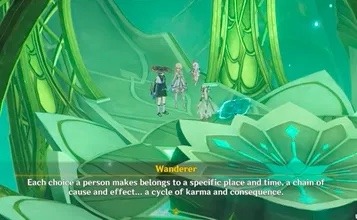
"As a physician, I teach karma from a scientific point of view. I ask people to consider what happens to the physical elements of the body after they die. If we dug you[r corpse] up in ten years, the elements that made up the body [would] disperse and become other things. [So] If you die angry, what happens to that energy of anger?"
—What is Karma?, Jan Chozen Bays
We’re told in Liyue that the dreams and delusions of gods who are killed in battle outlive their physical forms, which is why the Yakshas are tasked with containing it and why Hu Tao’s family took it upon themselves to purify their remains with fire.
"These blazing rituals were especially commonplace during that ancient period of strife.
For the dreams and delusions of the silent corpses of gods would produce evil miasmas,
So the doctor took up that devilishly red staff, igniting all that was impure.
Those who have passed, unable to bear deep sadness, but who have since become shrouded by ill karma and calamity,
They shall be reduced to ashen butterflies in this flame, and receive relief from their misfortunes and hurts."
—Staff of Homa description
And so do the skeletal remains of Orobashi expel its own evil miasma in the form of the Tatarigami, which causes both physical illness and hallucinations to the inhabitants of Yashiori Island (when the protective wards aren’t working).
Even though Ei killed Orobashi with the intention to protect her nation (and it was a heavenly sentence he willingly accepted on behalf of Enkanomiya), Watatsumi people still resent her and the Shogunate for it —since she killed the god who brought their ancestors to the surface, after all. So much so, that when the civil war comes to an end, there are still soldiers who refuse to accept peace between the two factions.
Kouzen: Peace talks? Pfft... Everyone's been drawn in by the idea. That's why the future of Watatsumi Island is at stake. What's to stop the Tenryou Commission from stabbing us in the back? And what's to stop the Raiden Shogun from issuing another Vision Hunt Decree? We are the resistance! Everything hinges on our warrior's will! We can't trust the Tenryou Commission or the Raiden Shogun. But we can put faith in ourselves!
—from Kokomi’s story quest
They were even willing to use delusions, fully aware they were draining their life force, to their deaths if necessary.
Sangonomiya Kokomi: ...I have put out the order to seize all Delusions. The vast majority are showing some loss of vitality, but nothing serious. Sadly, a few have been... less fortunate…
Gorou: Your Excellency, I'm planning to establish a dedicated field hospital to monitor their condition. The soldiers are up in arms about the ban though. They know full well what a Delusion is, but they still intend to keep using them.
—from Omnipresence Over Mortals
The Fatui made these delusions with the remains of Orobashi, so essentially the Resistance weaponized the Tatarigami (made of Orobashi's karma) to channel the resentment that they felt for his death (their own karma).
Quite the symbolic way to represent how someone’s karma influences another’s in a chain of cause and effect.
It is curious then, that the Harbinger in charge of overseeing the distribution of delusions was none other than The Balladeer.
Can it really be just a coincidence how the paths of Scaramouche and Watatsumi people met at this crucial point in the story, through Orobashi's karma?
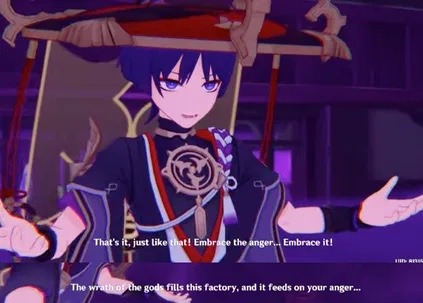
After all, Scaramouche's own life was affected by Orobashi's death as well.
Second betrayal:
The puppet known as Kabukimono integrated into the community of Tatarasuna with the help of locals involved in bladesmithing (Niwa, Katsuragi and Nagamasa), but he was later manipulated by Dottore into sacrificing himself, believing Niwa had betrayed him.
Tatarasuna was built as a means to dispose of Crystal Marrow, mined from Orobashi’s corpse, then bladesmiths started making Jade Steel to forge their weapons with it. The Fatui would eventually target Tatarasuna and its inhabitants to create conflict in the nation, and Dottore created the Mikage Furnace to concentrate the power of Tatarigami.
Third betrayal:
After leaving Tatarasuna, Kabukimono would take care of an orphaned child, but he later dies of the illness produced by Tatarigami.
Aftermath:
The puppet would then return years later under the identity of Kunikuzushi, murdering and intimidating the bladesmith clans as a revenge against Niwa —and possibly against the Raiden Shogun by eliminating the symbol of her martial power: the Raiden Gokaden.
This revenge would prompt some clan members to flee the nation, and one of them would end up taking a cursed sword which was granted a consciousness by the Tatarigami. This cursed sword then sought power to fulfill the will of its creator by committing a number of crimes until it met Kazuha, a descender of its creator’s clan.
The Kaedehara family had to give up the Isshin art after Kunikuzushi’s revenge, and by the time Kazuha inherited it there was nothing left of it, so he started a life of wandering.
And the Kamisato’s reputation would also be harmed in the process.
When individuals act on their karma, on these harmful impulses, it only generates more pain and leads into more resentment.
Dealing with pain in Buddhism
The main principle of Buddhist philosophy is to accept that suffering is a part of existence, both in physical pain and in the transient nature of pleasure: nothing lasts forever, and that includes things like physical health and positive feelings, but also the circumstances of suffering itself. Since everything is transitory, one should not hold onto neither pain, pleasure nor material existence.
”The practitioner seeks to understand his or her emotions and see their nature. When anger comes up, we try to look at ourselves and our anger in order to see the egolessness of our mind and the emptiness of that anger. Anger, as everything else, is not something solid, something truly and independently existing. Through this understanding, the negative emotions are counterbalanced and positive emotions gradually arise."
—Daring Steps: Traversing the Path of the Buddha, Ringu Tulku
Ignorance is another form of suffering, in the way that people’s worldviews are flawed, so humans inherently cause pain to themselves and each other. If you don't know how to let go of your pain, whether it's things like grief or anger, you might choose to deal with them in harmful ways. Buddhism also accepts this is the nature of the world, with humans who inflict pain on others due to their ignorance. This isn't meant to be an excuse for people's actions, everyone makes their own choices, but rather a way for people to understand pain has no purpose, so fixating on what originates it will only cause the person more harm.
Something I find interesting about the Inazuma chapter (I’m not sure about the other nations) is they seem to use characters of divine/supernatural nature as foils for characters who are humans. Both embody certain principles or philosophies, but the divine character is depicted in a symbolic or allegorical way, and the human character depicted with a more realistic approach.
Case in point: Raiden Ei and Kazuha with Buddhist doctrines.
Ei’s character arc throughout the archon quest and her story quests revolve around her accepting she can’t sacrifice herself eternally just to ensure the physical survival of her nation. Her pursuit of eternity was not dogmatic, she didn’t believe it was superior to transient existence; she just didn’t want her nation to be in danger of destruction for trespassing the boundaries set by the Heavenly Principles, like Khaenri’ah did.
She also symbolizes the concepts of “no-self” and “no-mind” through her meditation in the Plane of Euthymia.
Kazuha, on the other hand, was able to let go of his personal burdens to live a life of inner peace. His family was a victim of the Raiden Gokaden incident and by the time he inherited the clan it was in ruins, so instead of holding onto this pain and the misfortune that accompanied his following journeys, he decided to accept life as it was and only focus on the positive.
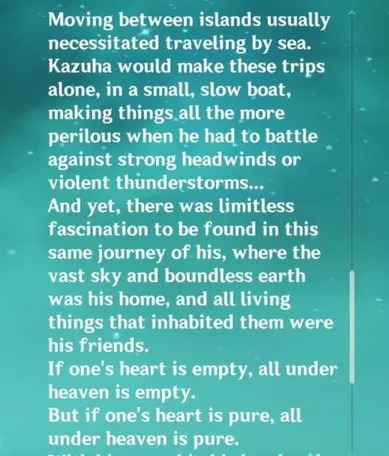
Buddhism is separated into three major paths of practice, three “vehicles” as they call it. Theravada is the oldest surviving school after the death of the Buddha, then Mahayana was made as an alternative branch by practitioners who believed the purpose of enlightenment should be to help others find their own enlightenment as well.
Mahayana is the branch that spread largely through East Asia, reaching Japan in the 6th century where it would syncretize (“mix”) with the indigenous religion of Japanese people (Shinto).
A person or deity who reaches enlightenment but still stays in the illusory material world is known as a Bodhisattva in Mahayana Buddhism.
"In the Mahayana schools of Buddhist teaching, there is greater emphasis on becoming enlightened for the sake of all beings, rather than simply to liberate oneself. The path for this is the Bodhisattva path of the Mahayana. The Theravadan path culminates with becoming an Arhat. The Mahayana also emphasizes embracing the illusion with love, where traditionally the Theravadin discipline distances from the samsaric illusion in order to awaken."
—Vajrayana Buddhism: Beliefs, Meditations, and Practices, Lama Döndrup
In this sense, Ei functions as a deity who has transformed into a Bodhisattva herself, symbolizing certain core aspects of Buddhist teachings, while Kazuha embodies the practices in realistic down-to-earth ways.
Ei and Kazuha found their own way to enlightenment by letting go of their pain through practices inspired by Mahayana Buddhist doctrines, but is this kind of healing through such passive means even possible for most?
After all, not everyone can be a self sacrificing bodhisattva like Ei or overcome suffering like Kazuha. Sometimes a person’s suffering is met with anything but compassion, and it creates resentment that can lead people into self-destructive paths of accumulated karma.
Sometimes the idea of letting go of anger at what has been done to someone is impossible. Scaramouche and Watatsumi Island are proof of this.
Enter Vajrayana Buddhism
Vajrayana (also known as Esoteric or Tibetan) is the third major branch of the “vehicles” of Buddhism, it was created from Mahayana Buddhism so they share the same purpose. The difference is Vajrayana uses tantras and rituals alongside meditation.
It has the same compassionate deities in the form of Bodhisattvas, but in addition they also worship fierce or “wrathful” deities called the Wisdom Kings.
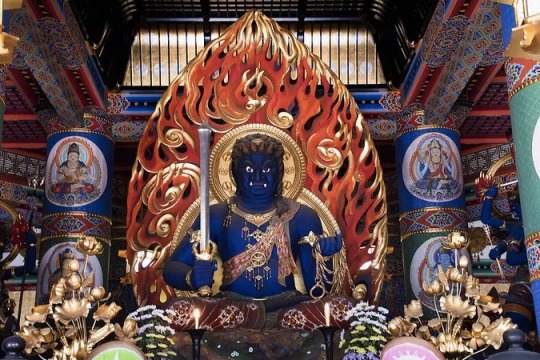
"In contrast to the saintly images of the Buddha and Bodhisattva, images of the [Wisdom Kings] are ferocious and menacing, for their threatening postures and facial expressions are designed to subdue evil spirits and convert nonbelievers. They are often depicted engulfed in flames, which according to Buddhist lore, represent the purification of the mind by the burning away of all material desires."
—Godai Myō-ō - Five Great Kings
Mahayana is largely practiced in Japan, but the Vajrayana school did make it into the country and became known as Shingon and Tendai Buddhism.
These schools have special worship for one of these wrathful deities: Acala also known as Fudō in Japanese, who is depicted with a lotus flower in his head (like Wanderer's hat).
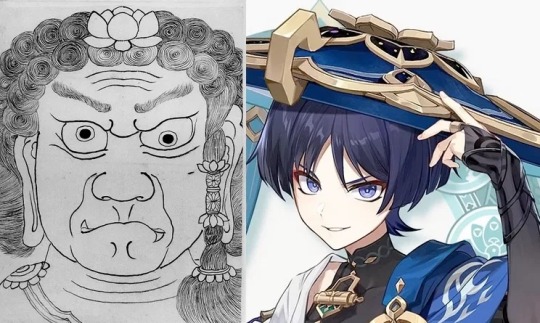
Fudō functions as a symbol of enlightenment through destruction, he's a deity who destroys your suffering and ignorance (the obstacles for enlightenment) and converts anger into salvation.
The fire ritual of Homa (known as Goma in Japanese), the same one referenced in Staff of Homa, is performed in different religions in Asia, but in Japan the deity that's invoked in it is precisely Fudō. The purifying fire represents the god's wisdom and the firewood burnt in the fire represents the source of suffering.
A puppet consumed by a raging fire will leave behind ashes. As for what will emerge from them…
—Wanderer’s “About: Puppet” voiceline
Wanderer takes its inspiration from this school of Japanese Buddhism. For example, his signature weapon (Tulaytullah's Remembrance) is designed to look like a Ghanta, a classic ritual symbol of Vajrayana Buddhism.
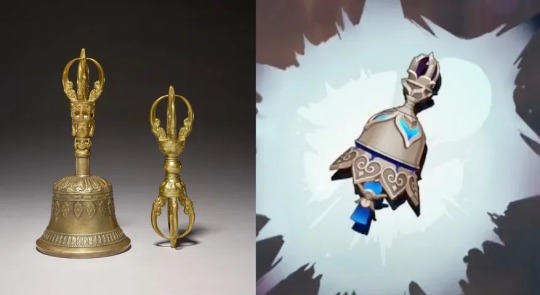
Both the worship of Fudō and the Goma rituals are also practiced in Shugendō, a highly syncretic religion made out of multiple existing religions and traditions that reached Japan, and is closely associated with the Shingon and Tendai sects of Vajrayana Buddhism.
Wanderer's outfit is inspired on a Shugendō monk.
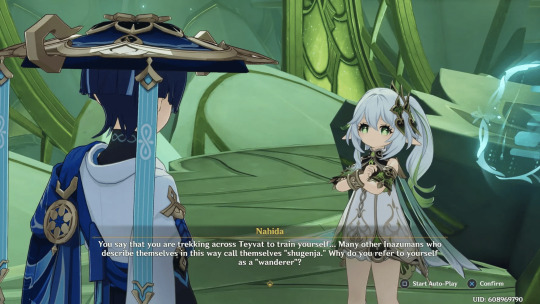
Destruction as a means for healing
One thing that fascinates me about his character is that anger is justified as a rightful result of trauma through his arc. This is also shortly addressed through Nahida, since it's precisely anger at what the sages have done to her that allows her to escape her dream prison, but she's an all compassionate god, so she won't indulge anger much. Scara, on the other hand, doesn't neglect his even after his anemofication.
I once thought that deification would allow me to get rid of all of my pointless emotions, but I’ve since abandoned that view.
Anger, whether it be from others or myself, is too convenient and useful as a tool.
How can some people just never become angry? I find that impossible to even imagine. Do they just not have a single mean bone in their bodies?
—Wanderer’s ”More About Him III” voiceline
It almost feels like he’s shading Ei and Kazuha, who follow this principle of Mahayana Buddhism as a form of dealing with their pain. Especially Ei, who —much like he initially intended with his deification— also kept herself in a state of emotional neutrality inside the Plane of Euthymia.
As the audience of a fictional story, however, having a character overcome their pain (whether resentment, grief, anger, etc) through passive acceptance like that just isn't as cathartic as validating their suffering through action.
It's interesting and validating in its own way, but y'know, it's not Scara standing in front of Shouki no Kami, the personification of his own pain, and obliterating it with a smile on his face. It just hits different.
And suffering in Vajrayana is dealt with in a different manner than Mahayana:
Following the Vajrayana teachings, we do not give up or reject anything; rather we make use of whatever is there. We look at our negative emotions and accept them for what they are. Then we relax in this state of acceptance. Using the emotion itself, it is transformed or transmuted into the positive, into its true face. When, for instance, strong anger or desire arises, a Vajrayana practitioner is not afraid of it. Instead he or she would follow advice along the following lines: Have the courage to expose yourself to your emotions. Do not reject or suppress them, but do not follow them either.
The negative emotions themselves are used. The process is almost like using poison as medicine.
—Daring Steps: Traversing the Path of the Buddha, Ringu Tulku
When Wanderer faces his pain and sins in the form of Shouki no Kami, a larger than life robot that starts attacking him and traveler, it petrifies him. He's struggling to come to his senses, and yells with anger "All worthless dross will be purged, thats why... this won't be the end!" as he reaches out for his past incarnation.
Then an explosion occurs and when the smoke fades, Wanderer stands firm with the new vision he’s acquired. A battle between the two ensues, which Wanderer eventually wins.
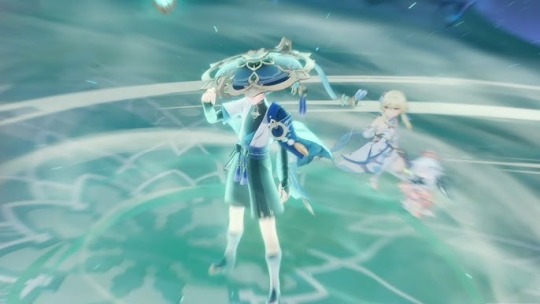
This is nothing like Kazuha's quiet acceptance, and nothing like Ei's patient meditation. There's rage, there's violence, and even a bit of fire. Just like the symbolic destruction of pain carried out by Fudō.
Wanderer does not let go of his pain, he destroys it.
His anger is redirected into a form of self advancement that allows him to overcome his suffering.
The allegorical approach of Buddhist doctrines portrayed through Wanderer is paralleled by the more down-to-earth resolution of Watatsumi’s conflict:
Kokomi also finds a way to redirect the resentment of the Watatsumi soldiers into a path of self advancement. The soldiers understand their intentions to take these urges into action against the Shogunate are wrong, but they don't know what to do with their feeling.
And so Kokomi doesn't punish them, instead she lets them form a special division where they will train not for revenge, but for the protection of their people. The rage is not quelled, the violence is not stopped, just redirected into actions for collective and personal well being.
Sangonomiya Kokomi: It was largely an oversight on my part: I taught you to nurture a warrior's will, but never how to let it go.
Tadakatsu: It's not your fault, Your Excellency! It was ours... our selfishness. Either way, we are ready to accept sentencing under martial law.
Sangonomiya Kokomi: Very well. Then I hereby declare... that as of today, I am founding a new Secret Corps of the army. This division will be responsible for keeping Watatsumi Island safe and secure, neutralizing any and all threats to the peace of our island. You and your comrades will all be welcome to join - but be warned, the training will be grueling. Perseverance and grit will be in high demand.
—from Kokomi’s story quest
#long post#genshin lore#analysis#inazuma#scaramouche#wanderer#watatsumi island#genshin analysis#enkanomiya#main post
31 notes
·
View notes
Text
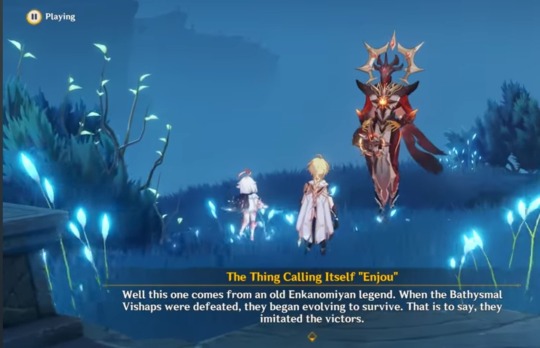
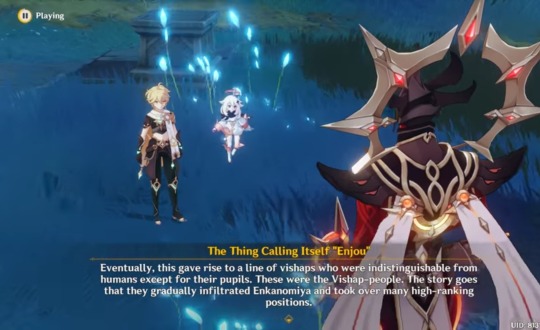
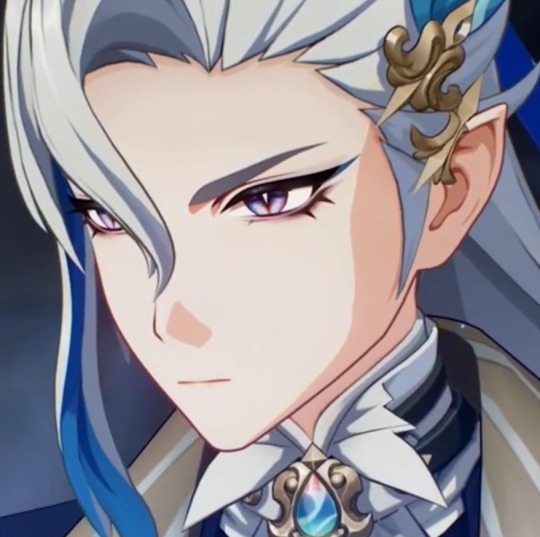
ONCE AGAIN REMINDING YALL ABOUT ENKANOMIYA AND THE VISHAPS !!!!
Neuvillette is the reborn Hydro Dragon,,, but he is also the product of the old legends from Enkanomiya, of vishaps who take the form of humans to take positions of power in their governments.
I'll never forgive Hyv for removing Kokomi's plot relevance as much as they did, but at least they stayed consistent about the details they introduced
#PLEASE TALK TO ME ABOUT ENKANOMIYA I LOVE IT SO MUCH#three realms gateway offering event#genshin impact event#genshin impact lore#enkanomiya lore#neuvillette#genshin impact
76 notes
·
View notes
Text
surely hoyoverse is aware that they already used nereides twice ("nereid's ascension" for kokomi's burst, where she dons the ceremonial garment, and "nereides" as the constellation name for sigewinne)
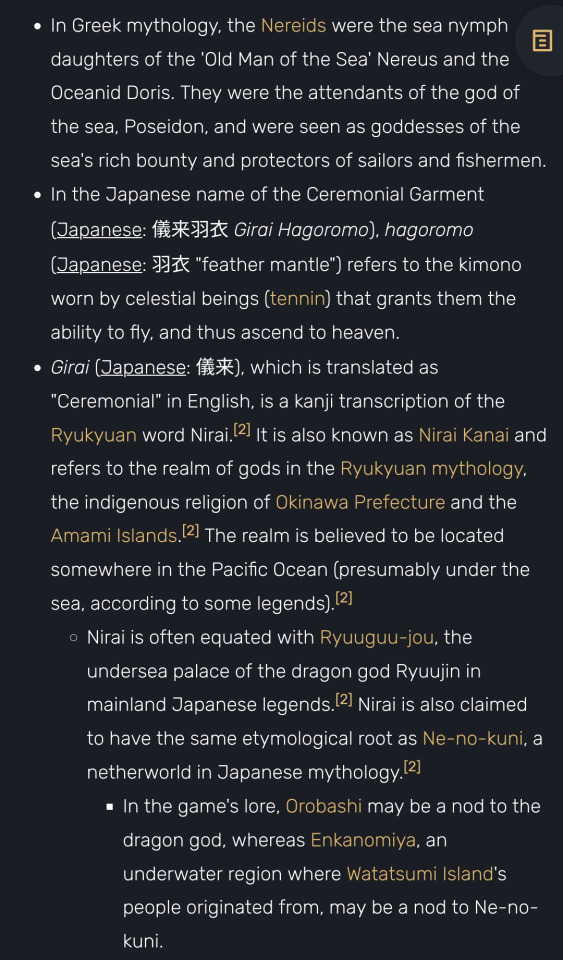
sigewinne "wondrous dragonheir" is going to have a promising story quest, but then again... that's also what I said about divine priestess sangonomiya "dracaena somnolenta" kokomi
ugh wait actually I'm kinda excited for sigewinne if she ends up expanding on the elynas lore and connect it back to ancient civilizations. enkanomiya part two, maybe?
but if sigewinne gets the nice dragon related backstory, that'll just make me even more disappointed with kokomi. a never ending cycle... kokomi I will always love you. I will always believe you're meant to be a better character
#mine musings#liveblogging genshin#genshin will be in version 7 with khaenri'ah and i'll still be waiting for better kokomi writing lmao#well at least she's not cyno i guess#kokomi at least had like. clear ties to orobashi and enkanomiya and the vishaps#cyno fans waited YEARS for even just a hint about his lore and the temple of silence#and like not just during sumeru's run. cyno showed up in the MANGA way back in like... v1???#or v1.1? either way cyno fans have waited since the beginning so like. other side greener grass i guess
7 notes
·
View notes
Text
still rolling perinheri around in my head btw. that "the eclipse is swallowed by the crimson moon" line from dainsleif's introduction makes a lot more sense now. lol
#personal stuff#delete later#what's with khaenri'ah's dynasties being moon-based. you guys do not have a moon down there.#or maybe they do? enkanomiya had a fake sun sure but maybe they stole one of the moon sisters' corpses or something idk.#joking. i know there's a line about them glimpsing the sun and the moon in perinheri.#the line about the seas being used as a metaphor for the space projected by the stars... oh mona stars lore we're really in it now#but yeah they really said sorry no dain quest with the march update like normal :( here's some khaenri'ah lore snippets instead#the crimson moon dynasty being all about alchemy and beastmastering... the rifthounds coming from this time...#so rhinedottir's probably from the crimson moon dynasty then.#this means little to me since we have no idea how long the eclipse dynasty lasted before the cataclysm happened#still cool to know more about the dynasties though. khaenri'ah lore that doesn't revolve around the cataclysm my beloved.#i mean it does kind of. it lends context to the cataclysm in that the crimson moon [dynasty] swallowed the eclipse [dynasty]#or at least the legacy of the crimson moon dynasty [alchemy; beastmastering; and likely a connection with the abyss] did that#really curious to know if there was like. political unrest in khaenri'ah based on the two [or more] dynasties vying for power?#hmm. also alberich namedrop in perinheri wooo#diluc and kaeya shaking hands our family name comes from a guy way back when who was a knight!!
12 notes
·
View notes
Text
genshin fans love lying & being racist
#go on tiktok see blatantly untrue info about genshin lore. log off#genshin tiktoker voice ermmmmm actually ei & makoto were fine & the people of watatsumi were the bad guys.#never mind the real life parallels of the people of watatsumi & colonisation. dont look up okinawa at all. nvm the fact that enkanomiya was#destroyed forcing the ppl of watatsumi to watatsumi island#& everyone in the comments is just agreeing. i feel bonkers#i cannot comment on how well it was done but the parallels between watatsumi & okinawa are like. obvious. my god
2 notes
·
View notes
Text
I only just unlocked Enkanomiya today (yes I’m aware it’s been a long time and I’m still catching up on a lot of other quests too. Don’t judge me) and still working through it, but “Enjou” saying that we might face betrayal from Paimon is… amusing. It’s definitely something that could happen and they are adding a lot of hints towards that as we go on, though I’m not holding my breath for that either since they may just not go for that angle 🤷♀️ who knows but it’s certainly fun to think about the possibilities!
#genshin impact#genshin#video games#genshin paimon#genshin lore#genshin speculation#genshin enjou#genshin enkanomiya#genshin traveler
9 notes
·
View notes
Text
this is going to take me a while but I'm cooking something
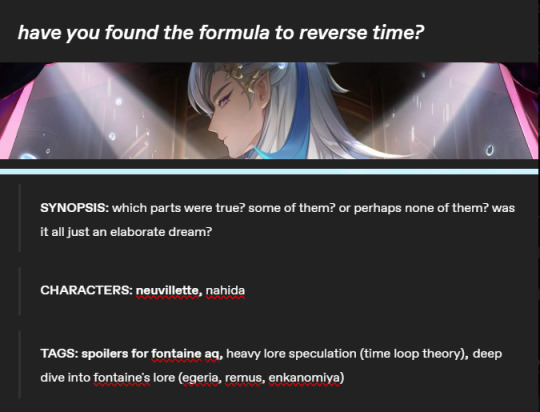
#victoria.collected miscellany#got a massive surge of inspiration while I was writing that furina piece#i'm doing the research for it now and ive already got a page and a half filled with notes and timeline stuff#why are timelines so ambiguous in this game anyway#its giving me a headache#if any lore nerds esp enkanomiya ones wanna help me that would be GREATLY APPRECIATED 🫶
2 notes
·
View notes